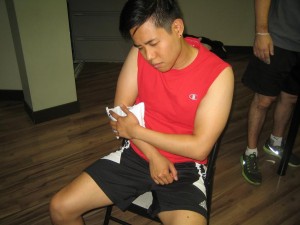Biceps tendinitis can occur once any of the tendons connecting the biceps muscles to a bone in the limb ends up inflamed or irritated. It is important to note that there are two tendons situated on top of the biceps that connects the muscle to the shoulder bones. Take note that these tendons facilitate movement of the arm. Once the bicep muscle contracts, it jerks on the tendon so that the arm will either rotate or bend. There are certain conditions that can cause biceps tendinitis but there are also preventive measures that must be taken into consideration to avoid this injury.
Overuse
A simple action such as lifting the arm overhead in a repeated manner can eventually lead to wear and tear. This is likely to occur as one ages since the tendons naturally lose their elasticity. Certain sports such as tennis, swimming, baseball and basketball can increase the risk. Daily tasks at home or at work that entails constant reaching overhead can also contribute to the condition.

If an individual sustains a direct blow to the arm, the tendon can end up inflamed. The ideal way to manage this condition is to instruct the individual to rest as soon as the symptoms manifest and before it becomes chronic. The individual must take some time to rest. Inflammation can be easily managed with first aid measures at home. If you want to learn how to properly manage inflammation or swelling, all you have to do is to register in a first aid class in Ottawa.
Certain medical conditions
Bicep tendinitis can oftentimes occur as a complication of another medical condition that involves the weakening of the joints and muscles. The possible conditions include rheumatoid arthritis or osteoarthritis in the shoulder and even rotator cuff injuries.
By properly managing the underlying condition, it can help reduce the risk and severity of the injury. In most cases, the use of medications, injections and even undergoing physical therapy can help manage the symptoms of other medical conditions that can lead to bicep tendinitis.
Tight and weak muscles
Once the muscles in the shoulder or arm are tight or weak, the tendon might be subjected to excess force that causes it to swell. The individual must find a way to keep the muscles of the shoulder and arm flexible and strong to prevent biceps tendinitis from developing. This would require undergoing a strength training program as well as daily stretching.
Always remember that strong muscles are capable of stabilizing the joint during movement. As long as the muscles are flexible, they are less likely to pull on the tendon and result to injury. The individual must perform correct warming up and cool down exercises when engaged in physical activities. This will reduce the risk for developing biceps tendinitis.
